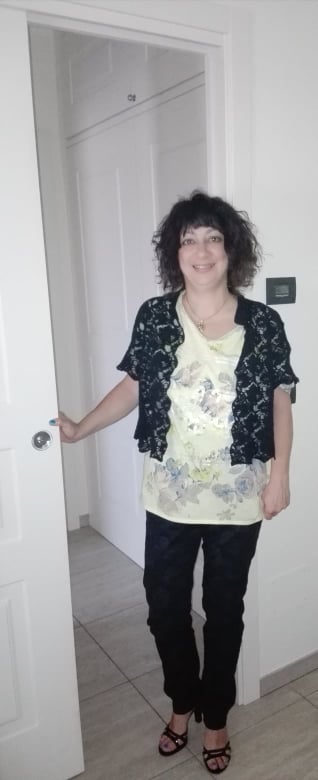The guest of the Library blog Geros knygos and the column Library Conversations is fellow librarian Cinzia Puccetti (Italy). Cinzia is in charge of educational and cultural projects of Bagno a Ripoli Public Library. Read the conversation and learn more about our colleagues!
Italy was the first country after China to be invaded by the pandemic, with a very high number of infected and dead Italians. The impact of COVID-19 was not just on health. What was the impact on Italian libraries? What activities and services took place in libraries in Italy during the emergency?

With a law issued on 8 March, all libraries in Italy were closed and all events and library services which normally take place in the library, such as reading promotion, were suspended. It was a hard time, no library had the experience to handle a pandemic, but very quickly the librarians started with new activities to face the pandemic emergency with solidarity, and above all they carried on some new skills through creative ways.
Libraries are the great connectors so first many libraries immediately tried to support users by improving and promoting digital resources such as borrowing of audio, e-books, free film streaming service. Most of Italian libraries were promoting two national digital lending platforms: MLOL (Media Library on Line) and INDACOWeb. Users have free access to digital library with Italian and foreign newspapers, magazines, e-books, music, audio-books. Following the Coronavirus emergency, there were more and more free of charge online resources available to help with learning and research, provided by publishers or other companies, for example: e-books collection, virtual tours of libraries and museums with guided tours in different languages, from the Uffizi Gallery in Florence to Venice’s Palazzo Ducale. Italian cultural institutions were generous with providing a multitude of offers and initiatives under the hashtag #laculturanonsiferma (#culture can’tbestopped) #iorestoacasaeleggo (#Istayhomeandread ) launched to encourage residents to stay at home. In the website of our Ministry of Culture you can find a lot of information and endless opportunities for digital readers.
Moreover to meet the needs of senior users, and for people who cannot access the internet or who do not have a computer or smartphone at home, many libraries started the home delivery service, even in small libraries with very few staff – thanks to the helpfulness of volunteers. With libraries closed, many initiatives for children had to shift all activities to online mode such as readings via videos, collection of digital story times, but also some libraries were able to offer a service of storytelling by telephone. Users could book the service from a librarian who reads fairy tales to a child by phone. This service is named Favole al Telefono, (Fairy tales over the phone) like the famous book for children written by Gianni Rodari. Just this year the centenary of his birth falls! So during the pandemic time the number of digital readers increased and this experience offers to reflect the work of collection development and management when the health emergency will be over.
What about the public library of Bagno a Ripoli? How did the period of COVID-19 emergency affect it‘s services? How did you reach your users during that period?
The library where I have been working since 2005 as a librarian, is a medium-sized public library, of a municipality of Bagno a Ripoli, in the Metropolitan area of Florence. There are about 25,000 inhabitants in the town. In usual times about 180–200 people a day visit the Library : many children, students and elderly people. During the emergency the main library and it‘s two branches were closed: the libraries and loan services at the local hospital and at one store in the city centre. At the same time the reading promotion activities for schoolchildren, students, adults, and work with volunteers were stopped. During the first period of pandemic the librarians worked basically in two different ways: chiefly working from home, in order to protect library staff and at the same time providing some services. First of all the loan’s expiry date was stopped and during the forced closure we decided to promote the digital platform called MLOL on our social channels. We created subject guides to help our users to find the information, we developed a page on our website of cultural resources available free of charge supported by publishers or other companies, for example TRIO – a web learning system of the Tuscany Region which provides free access to e-learning, moreover a collection of children’s readings; a collection of e-books and audiobooks, videos. The full list of available materials you can find on our website: http://biblioteca.comune.bagno-a-ripoli.fi.it/biblioteca/iorestoacasa.
While working from home, we had the opportunity to catalogue a lot of items in order to increase and update both our library collections and our online catalogue for users. Secondly, we did back office work, which is not always well seen to the public, but it is so important for a public library! With the empty library we had the opportunity to update and review library collections, tidying up the collections (the library fund contains over 80,000 books, DVDs, CD-ROMs, journals, newspapers, magazines and other items).
Before the end of April the library began home-delivering library loans. Our users could send their request via email or phone where they also informed not being infected and the items were delivered directly to their home (thanks to the collaboration of the Italian Red Cross).
Later, when the government gave the possibility to move with fewer restrictions, we began the phase of gradual reopening of the library. We are lucky because the library has a large garden full of trees and flowers (especially roses) and we have many tables. So we decided to move the reading room to the garden, where our users had to book a seat in advance. A group of volunteers checked the social distancing among the users. And thanks to the availability of a large garden, from June to the end of July a chess course was organized for children and teenagers aged 11 to 17 and entertaining readings for younger children. At the same time we started again the lending and return service directly at the library, following a sort of take-away service, with some necessary restrictions. Returned books still are kept in quarantine for 7 days.
At the moment it is still not possible to pick up books from the shelves, the items are prepared by librarians who advise their users to come at the library at certain time to collect the required documents in order to avoid queues. At the moment our reading rooms, newspaper sections, internet and reference services are open for very few users, which have to book a seat in advance. The users and librarians must wear face masks, sanitize their hands and keep social distancing.
What book would you call valuable? Where does the value of the book lie?
In my opinion a valuable book is the one that you carry on inside yourself, maybe for ever. As a reader and as a librarian I think that the book is really valuable if you want to go on reading, if you have goosebumps, when you cry, laugh or smile when holding that book in your hands, and at the end you feel so fulfilled and you want to read more and more.
What is your favorite genre? To you, which author is the master of that genre?
I like reading but I haven’t a favourite genre. I like reading novels with a social and spiritual background, aimed at grasping the aspects of society, generally with the aim of emphasizing the strengths or weaknesses, inequalities among human beings. I like reading poetry and biographical novels.
Are digital books competitors to printed books?
I don’t think so. In my opinion printed books and digital books are not in competition, they are equally important, they both spread pleasure of reading. Printed books have traditions of many centuries, while digital ones haven’t, but in fact it is a benefit for us because we can choose one type of books or both. I prefer reading printed books, my eyes get tired less and I like the smell of books.
What are your favourite Italian authors or books of Italian authors?
The history of Italian literature began in the 12th century, Italy has always had many important writers and poets who contributed to the birth of European culture and I’m proud of it. I like reading Italian writers and poets. At the moment my favourite Italian authors are Paolo Rumiz ( a journalist, traveler and writer), Erri de Luca ( a novelist, translator and poet) and Alda Merini (she was a poet and writer).
What three books would come to your mind first, if we asked you to name three favourite ones?
It would be a long list, but first to my mind come those favourite books: „Letter to a Child Never Born“ by Oriana Fallaci, „The Power and the Glory“ by Graham Greene, „Animal Farm“ by George Orwell.
If you were writing yourself, what would the book be about?
It would be a book about joy, beauty of life, it would be a hymn to life!
Has a book ever made you laugh out loud or cry? Do you remember what were those books?
Yes, of course, I have read such books. These two books made me cry: „If this is a Man“ by Primo Levi and „Chernobyl Prayer: A Chronicle of the Future“ by Svjatlana Aleksievič. The books which made my laugh – „Bar Sport“ by Stefano Benni, „A Charming Mass Suicide“ by Arto Tapio Paasilinna.
American actress Nice Nash said: “I don‘t trust people who don‘t read“. What do you think of this statement? Do you agree with it?
Reading strengthens our mind, analytical skills and knowledge, moreover reading is a pleasant pastime, a source of intense emotions and different point of views, of course if it is a free choice – otherwise it is useless. In my opinion, it’s more important to understand why people do not read. I would like to mention one important initiative promoted by our country Nati per leggere (Born to read). It is developed among the Pediatric Cultural Association, the Italian Library Association and the Child Health Centre and promoting early literacy for parents and their children. You can find the information about this initiative on our website: http://www.natiperleggere.it/
Thank you!
Interviewed by Virginija Švedienė
Panevėžys County Gabrielė Petkevičaitė-Bitė Public Library
